

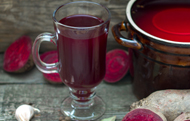
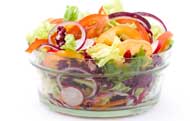
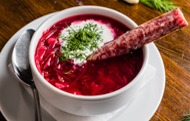

1. Beetroot Facts
2. Types of Beetroot
3. Beetroot Nutritional value
4. Beetroot Health Benefits
Beet or Beta vulgaris is a plant in the Amaranthaceae family. The roots are most commonly deep red-purple, however there are lighter, less common varieties available.
History and Origin
The various wild and cultivated varieties of Beets have a long an interesting history. The first cultivated forms are believed to have been in the Mediterranean with it being introduced to the Middle East, India and then to China by 850 AD. They were used as medicinal plants in Ancient Greece and Medieval Europe.
Ancient Romans used Beetroot to treat fevers and constipation. It was used in certain soup recipes as a laxative. Beetroot juice has been considered an aphrodisiac (sexual stamina) since Roman times. It is known to be used internally as a juice, by some cultures, for the treatment of respiratory disorders, fevers and infections. Throughout ancient times there is an indication that some beet leaves have been used to bind wounds.
- • Albino
- • Bull's Blood
- • Chioggia
- • Crosby's Egyptian
- • Cylindra / Formanova
- • Detroit Dark Red
- • Early Wonder
- • Golden Beet / Burpee's Golden
- • Perfected Detroit
- • Red Ace
- • Ruby Queen
- • Touchstone Gold
The most common beetroot varieties include classic red types like 'Detroit Dark Red' and 'Red Ace', which are widely sold in grocery stores. Other common types include golden beets like 'Burpee's Golden' and heirloom varieties such as the striped 'Chioggia' and the white 'Albino'.
Red beets
Detroit Dark Red: A popular commercial variety known for its sweet, relatively earthy flavour. It has deep red roots and red-veined green leaves.
Red Ace: A hybrid with a bright red root and red-tinged leaves, commonly grown for commercial markets.
Boltardy: A hardy and bolt-resistant variety favoured by many gardeners for its sweet, globe-shaped roots.
Ruby Queen: is a type of beetroot known for its sweet flavour, tender, round roots, and rich, deep red colour. It is an early-maturing variety that is excellent for canning and pickling, as it holds its shape and colour well. Ruby Queen performs reliably in a variety of conditions, including poor soil, and is valued for its uniform and consistent production.
Golden beets
Burpee's Golden: Features orange skin with golden yellow flesh. It has a sweet taste and is less likely to stain surfaces.
Touchstone Gold: A newer variety with small yellow roots that retain their colour after cooking.
Specialty and heirloom varieties
Chioggia: Also known as "candy stripe," this heirloom variety has a distinctive red and white ring pattern on the inside that fades to pink when cooked.
Cylindra: Grown for its long, cylindrical shape, which makes for uniformly sized slices.
Lutz Green Leaf: A large, heirloom variety with a good storage quality and sweet flavour, especially when harvested small.
Bull's Blood: An heirloom variety known for its deep red, edible leaves, in addition to its roots.
Crosby's Egyptian - A red heirloom variety that originated in Germany in the late 1800's. It was improved in the USA by Josiah Crosby, who selected to retain the earliness and to remove the rough nature of the original 'Flat Egyptian' variety. Harvest young for a baby beet or mature for a large, full-sized root.
Perfected Detroit: refers to the Perfected Detroit Dark Red, an improved version of the classic Detroit Dark Red beet that offers more uniform, globe-shaped roots and retains the original variety's sweet flavour and deep crimson colour. It is known for its consistent high yield, with both the roots and their dark green tops (with red veins) being edible. This versatile heirloom is a popular choice for home gardeners, as it can be eaten raw, roasted, or pickled.
Early Wonder: is a fast-maturing, heirloom beetroot variety known for its round, dark red roots and large, green leaves that are also edible. It is sweet, tender, and can be eaten raw in salads or cooked, and is suitable for various climates and growing conditions, including containers. This variety is an older heirloom type that is reliable and has been popular for a long time.
Albino: The "Albino" beetroot, also known as White Albino or Albino Vereduna, is a type of beetroot with a pure white, sweet flesh that does not stain. This heirloom variety, originally from Holland, is round and can grow to be very sweet, making it ideal for raw, cooked, and pickled preparations. It is a high-yielding, dual-purpose crop that also produces edible, nutritious greens.
Vegetables " Beetroot " ( Nutritional value )
Nutritional value per 100 g
Beets, cooked, boiled, drained
|
Nutrient (Proximity)
|
Unit
|
Value
|
Daily Value %
|
|
Energy
|
kcal
|
44
|
2.2%
|
|
Protein
|
g
|
1.68
|
3.3%
|
|
Total lipid (fat)
|
g
|
0.18
|
0.2%
|
|
Carbohydrate, by difference
|
g
|
9.96
|
3.6%
|
|
Fiber, total dietary
|
g
|
2.0
|
7.1%
|
|
Sugars, total
|
g
|
7.96
|
|
|
Minerals
|
|||
|
Calcium, Ca
|
mg
|
16
|
1.2%
|
|
Iron, Fe
|
mg
|
0.79
|
4.3%
|
|
Magnesium, Mg
|
mg
|
23
|
5.4%
|
|
Phosphorus, P
|
mg
|
38
|
3%
|
|
Potassium, K
|
mg
|
305
|
6.4%
|
|
Sodium, Na
|
mg
|
77
|
3.3%
|
|
Zinc, Zn
|
mg
|
0.35
|
3.1%
|
|
Copper, Cu
|
mg
|
0.074
|
8.2%
|
|
Manganese, Mn
|
mg
|
0.326
|
14.1%
|
|
Selenium, Se
|
mcg
|
0.7
|
1.2%
|
|
Vitamins
|
|||
|
Vitamin C, total ascorbic acid
|
mg
|
3.6
|
4%
|
|
Thiamin (B-1)
|
mg
|
0.027
|
2.2%
|
|
Riboflavin (B-2)
|
mg
|
0.040
|
3%
|
|
Niacin NE (niacin) (B-3)
|
mg
|
0.331
|
2%
|
|
Pantothenic acid (B-5)
|
mg
|
0.145
|
2.9%
|
|
Vitamin B-6
|
mg
|
0.067
|
3.9%
|
|
Folate DFE (dietary folate) (B-9)
|
mcg
|
80
|
20%
|
|
Vitamin B-12
|
mcg
|
0.00
|
|
|
Vitamin A, RAE (retinol)
|
mcg
|
2
|
0.2%
|
|
Vitamin E (alpha-tocopherol)
|
mg
|
0.04
|
0.2%
|
|
Vitamin D (D2 + D3)
|
mcg
|
0
|
|
|
Vitamin K (phylloquinone)
|
mcg
|
0.2
|
0.1%
|
|
Lipids
|
|||
|
Saturated Fatty Acids
|
g
|
0.028
|
|
|
Monounsaturated Fatty Acids
|
g
|
0.035
|
|
|
Polyunsaturated Fatty Acids
|
g
|
0.064
|
|
|
Trans Fatty Acids
|
g
|
0.000
|
|
|
Carotenoids
|
|||
|
Beta-Carotene
|
mcg
|
21
|
|
|
Lutein + zeaxanthin
|
mcg
|
0
|
|
|
Lycopene
|
mcg
|
0
|
|
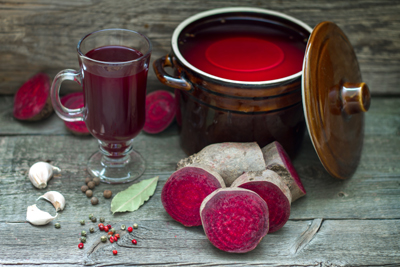
|
Reference Values are based on a 2,000 Calorie Intake, for Adults and Children 4 or More Years of Age. Your daily values may be higher or lower depending on your calorie needs.
|
|
Percentages are roughly approximated using (RDA) Recommended Dietary Allowances for adults. Source: Nutrient Database - USDA (United States Department of Agriculture)
|
|
Reference Values for Nutrition - FDA U.S. Food and Drug Administration
|
Beetroot Nutritional Value
Beetroot is a nutrient-dense vegetable that offers numerous health benefits, including supporting heart health by lowering blood pressure, improving exercise performance, and providing antioxidants to reduce inflammation. It is rich in vitamins, minerals, and fiber, while being low in calories, fat, and cholesterol.
Beetroot benefits not listed in table below:
Supports liver function - Beetroot supports liver function by protecting against oxidative damage, reducing fat accumulation, and aiding detoxification. It contains antioxidants like glutathione and has been shown in studies to reduce liver enzymes and cholesterol, particularly in combination with a healthy lifestyle like the Mediterranean diet.
Rich in vitamins and minerals - Beetroot is rich in vitamins and minerals, making it a highly nutritious food. It is an excellent source of folate (vitamin B9), vitamin C, potassium, magnesium, iron, and fiber. The leafy green tops are particularly high in vitamins A and K, while the root provides various B vitamins and minerals like manganese and copper.
Helps manage cholesterol - Beetroot helps manage cholesterol and reduce heart attack and stroke risk due to its high content of soluble fiber, flavonoids, and betacyanin. Soluble fiber lowers LDL ("bad") cholesterol, while the antioxidants betacyanin and flavonoids prevent LDL oxidation and deposition in arteries. This, combined with betacyanin's overall antioxidant and anti-inflammatory properties, protects blood vessels and supports cardiovascular health.
Anaemia - Beetroot contains iron, a key nutrient for red blood cells and oxygen transport, and can be beneficial for anaemia, though it's not a rich source. While beetroot is a good source of folate, vitamin C, and copper, which can enhance iron absorption, its iron content is relatively low, with about 0.8 mg of iron per cup of beet juice. For significant iron intake to combat anaemia, consuming it alongside foods rich in iron, such as leafy green vegetables, organ meats, or taking supplements, is recommended.
Help with constipation - Beetroot can help with constipation due to its high fiber content, which includes both soluble and insoluble fiber. Soluble fiber absorbs water to create a gel-like substance that softens stool, while insoluble fiber adds bulk, which can both soften and speed up bowel movements. Adding beetroot to your diet, along with adequate fluid intake, can improve digestive regularity.
Slow tumour growth - Compounds called betacyanin’s, found in beetroot, are thought to slow tumour growth and have anti-cancer properties by reducing inflammation and promoting cell death (apoptosis) in various cancer cells and animal models, including those for breast, prostate, and oesophageal cancers. While promising in lab studies, more research is needed to confirm these effects in humans and determine their specific role in cancer prevention and treatment.
- SUPPORTS CARDIOVASCULAR HEALTH
Beetroot supports cardiovascular health primarily by lowering blood pressure and improving blood flow due to its high inorganic nitrate content, which the body converts to nitric oxide. This process relaxes and widens blood vessels, and beetroot also contains antioxidants and anti-inflammatory compounds that protect the heart. - PROTECTS AGAINST CELL DAMAGE
Beetroot helps protect against cell damage due to its high antioxidant content, which fights oxidative and nitrative stress. Key compounds like betalains act as powerful antioxidants that neutralize free radicals, protect DNA from damage, and reduce inflammation. This antioxidant activity can help protect against cell damage to DNA, lipids, and proteins in both in vitro and in vivo studies. - ALZHEIMER'S
Data suggest that betanin, a compound in beet extract, shows some promise as an inhibitor of certain chemical reactions in the brain that are involved in the progression of Alzheimer's disease,” says Li-June Ming, Ph. D. at the University of South Florida. - BENEFICIAL TO EAT DURING PREGNANCY
Beetroot is safe and beneficial to eat during pregnancy when consumed in moderation as part of a balanced diet. It provides essential nutrients like folate, which helps prevent neural tube defects, and iron, which helps prevent anaemia. However, wash thoroughly to remove dirt, and consult a healthcare provider for personalized advice. - BOOSTS EXERCISE PERFORMANCE
Beetroot boosts exercise performance by increasing nitric oxide in the body, which improves blood flow and oxygen delivery to muscles. This leads to benefits such as increased endurance, higher power output, improved efficiency, and reduced fatigue during both aerobic and high-intensity exercise.
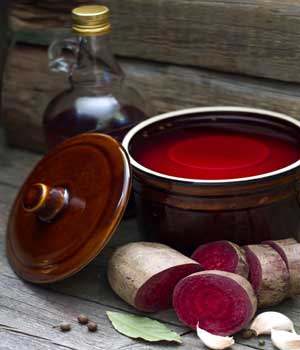
- SPEEDS UP RECOVERY
Beetroot can speed up recovery by reducing muscle damage and inflammation due to its high content of nitrates, antioxidants, and phytochemicals. It helps by improving blood flow, which delivers more oxygen and clears metabolic waste from muscles, and can also aid in phosphocreatine resynthesis, a key energy source for muscles. - FIGHTS INFLAMMATION
Beetroot fights inflammation due to its high concentration of antioxidants and anti-inflammatory compounds called betalains. These compounds can help reduce markers of inflammation, protect against oxidative stress, and may lower the risk of chronic diseases. - ANTI-CANCER PROPERTIES
Betacyanin, the powerful plant pigment that gives beetroot its rich colour, is also thought to help suppress the development of some types of cancer, including bladder cancer. Beetroot contains other potential cancer-fighting compounds including ferric acid, ruin and kaempferol. - SUPPORTS DIGESTIVE HEALTH
Beetroot supports digestive health due to its high fiber content, which promotes regularity and prevents constipation. Additionally, compounds in beetroot, like betalains and glutamine, support a healthy gut lining and microbiome by increasing beneficial bacteria and short-chain fatty acids, while also providing antioxidants that reduce inflammation. - BOOSTS IMMUNE SYSTEM
Beetroot boosts brain health by increasing blood flow to the brain due to its high dietary nitrate content. This is because dietary nitrates are converted to nitric oxide, which helps dilate blood vessels, leading to improved oxygen and nutrient delivery to the brain, and potentially enhancing cognitive function, focus, and memory, especially in older adults. Beetroots also contain nutrients like folate and manganese that support brain function.
References
Nutrient Database - USDA (United States Department of Agriculture)
Reference Values for Nutrition - FDA U.S. Food and Drug Administration
Supports cardiovascular health - Beetroot supports cardiovascular health primarily by lowering blood pressure and improving blood flow due to its high inorganic nitrate content, which the body converts to nitric oxide. This process relaxes and widens blood vessels, and beetroot also contains antioxidants and anti-inflammatory compounds that protect the heart.
Anti-cancer properties - Betacyanin, the powerful plant pigment that gives beetroot its rich colour, is also thought to help suppress the development of some types of cancer, including bladder cancer. Beetroot contains other potential cancer-fighting compounds including ferric acid, ruin and kaempferol.
Alzheimer's - Data suggest that betanin, a compound in beet extract, shows some promise as an inhibitor of certain chemical reactions in the brain that are involved in the progression of Alzheimer's disease,” says Li-June Ming, Ph. D. at the University of South Florida.
Beneficial to eat during pregnancy - Beetroot is safe and beneficial to eat during pregnancy when consumed in moderation as part of a balanced diet. It provides essential nutrients like folate, which helps prevent neural tube defects, and iron, which helps prevent anaemia. However, wash thoroughly to remove dirt, and consult a healthcare provider for personalized advice.
Boosts exercise performance - Beetroot boosts exercise performance by increasing nitric oxide in the body, which improves blood flow and oxygen delivery to muscles. This leads to benefits such as increased endurance, higher power output, improved efficiency, and reduced fatigue during both aerobic and high-intensity exercise.
Speeds up recovery - Beetroot can speed up recovery by reducing muscle damage and inflammation due to its high content of nitrates, antioxidants, and phytochemicals. It helps by improving blood flow, which delivers more oxygen and clears metabolic waste from muscles, and can also aid in phosphocreatine resynthesis, a key energy source for muscles.
Fights inflammation - Beetroot fights inflammation due to its high concentration of antioxidants and anti-inflammatory compounds called betalains. These compounds can help reduce markers of inflammation, protect against oxidative stress, and may lower the risk of chronic diseases.
Protects against cell damage - Beetroot helps protect against cell damage due to its high antioxidant content, which fights oxidative and nitrative stress. Key compounds like betalains act as powerful antioxidants that neutralize free radicals, protect DNA from damage, and reduce inflammation. This antioxidant activity can help protect against cell damage to DNA, lipids, and proteins in both in vitro and in vivo studies.
Supports digestive health - Beetroot supports digestive health due to its high fiber content, which promotes regularity and prevents constipation. Additionally, compounds in beetroot, like betalains and glutamine, support a healthy gut lining and microbiome by increasing beneficial bacteria and short-chain fatty acids, while also providing antioxidants that reduce inflammation.
Boosts immune system - Beetroot boosts brain health by increasing blood flow to the brain due to its high dietary nitrate content. This is because dietary nitrates are converted to nitric oxide, which helps dilate blood vessels, leading to improved oxygen and nutrient delivery to the brain, and potentially enhancing cognitive function, focus, and memory, especially in older adults. Beetroots also contain nutrients like folate and manganese that support brain function.
Supports liver function - Beetroot supports liver function by protecting against oxidative damage, reducing fat accumulation, and aiding detoxification. It contains antioxidants like glutathione and has been shown in studies to reduce liver enzymes and cholesterol, particularly in combination with a healthy lifestyle like the Mediterranean diet.
Rich in vitamins and minerals - Beetroot is rich in vitamins and minerals, making it a highly nutritious food. It is an excellent source of folate (vitamin B9), vitamin C, potassium, magnesium, iron, and fiber. The leafy green tops are particularly high in vitamins A and K, while the root provides various B vitamins and minerals like manganese and copper.
Coronary heart disease (Beetroot helps reduce the risk of coronary heart disease (CHD) through its nitrate, glycine betaine, and betalain content). Nitrates are converted to nitric oxide (NO) to improve endothelial function and reduce blood pressure. Glycine betaine, also known as betaine, helps prevent arterial plaque formation and fights platelet clots. Betalains are antioxidant compounds that protect against oxidative stress. Together, these compounds help lower blood pressure, improve arterial stiffness, reduce inflammation, and protect against atherosclerosis.
Anaemia (Beetroot contains iron, a key nutrient for red blood cells and oxygen transport, and can be beneficial for anaemia, though it's not a rich source). While beetroot is a good source of folate, vitamin C, and copper, which can enhance iron absorption, its iron content is relatively low, with about 0.8 mg of iron per cup of beet juice. For significant iron intake to combat anaemia, consuming it alongside foods rich in iron, such as leafy green vegetables, organ meats, or taking supplements, is recommended.
Help with constipation (Beetroot can help with constipation due to its high fiber content, which includes both soluble and insoluble fiber). Soluble fiber absorbs water to create a gel-like substance that softens stool, while insoluble fiber adds bulk, which can both soften and speed up bowel movements. Adding beetroot to your diet, along with adequate fluid intake, can improve digestive regularity.
Slow tumour growth (Compounds called betacyanin’s, found in beetroot, are thought to slow tumour growth and have anti-cancer properties by reducing inflammation and promoting cell death (apoptosis) in various cancer cells and animal models, including those for breast, prostate, and oesophageal cancers). While promising in lab studies, more research is needed to confirm these effects in humans and determine their specific role in cancer prevention and treatment.
Benefiting cognitive health (Beetroot is linked to better brain function because its dietary nitrates convert to nitrites, which then increase nitric oxide (NO) production). Nitric oxide is a key molecule that improves blood flow and oxygen delivery to the brain, potentially benefiting cognitive health and reducing the risk of dementia, especially in older adults and those with cardiovascular risk factors.
Beneficial for pregnant women (Beetroot is beneficial for pregnant women because its abundant supply of folate (natural folic acid) helps prevent neural tube defects like spina bifida in the unborn child by aiding the proper formation of the baby's brain and spinal cord). Beets also provide fiber to help with constipation and nitrates that can improve blood flow to the placenta, potentially supporting healthy foetal growth. However, women are also advised to take a daily fortified folic acid supplement (400mcg) and consume other folate-rich foods.
Enhances stamina (Beetroot enhances stamina because its dietary nitrates are converted to nitric oxide (NO) in the body, which relaxes and expands blood vessels, increasing blood flow and oxygen delivery to muscles during exercise). This leads to improved endurance, greater exercise efficiency, and better performance in endurance activities.
Combat fatigue (Beetroot helps combat fatigue by supplying dietary nitrates that the body converts to nitric oxide, improving blood flow and oxygen delivery, and by providing iron and folate to support red blood cell production). The vitamin C in beetroot also enhances iron absorption. Regularly consuming beetroot, especially before exercise, can increase endurance, boost energy, and reduce the feeling of exhaustion.
Digestive health (Beetroot is a good source of dietary fiber, containing about 3.4 to 3.8 grams per one-cup serving, which promotes digestive health by feeding gut bacteria, adding bulk to stool, and preventing constipation). The fiber in beets, including both soluble and insoluble types, helps regulate bowel movements, contributing to overall gut health.
Helps manage cholesterol (Beetroot helps manage cholesterol and reduce heart attack and stroke risk due to its high content of soluble fiber, flavonoids, and betacyanin). Soluble fiber lowers LDL ("bad") cholesterol, while the antioxidants betacyanin and flavonoids prevent LDL oxidation and deposition in arteries. This, combined with betacyanin's overall antioxidant and anti-inflammatory properties, protects blood vessels and supports cardiovascular health.
